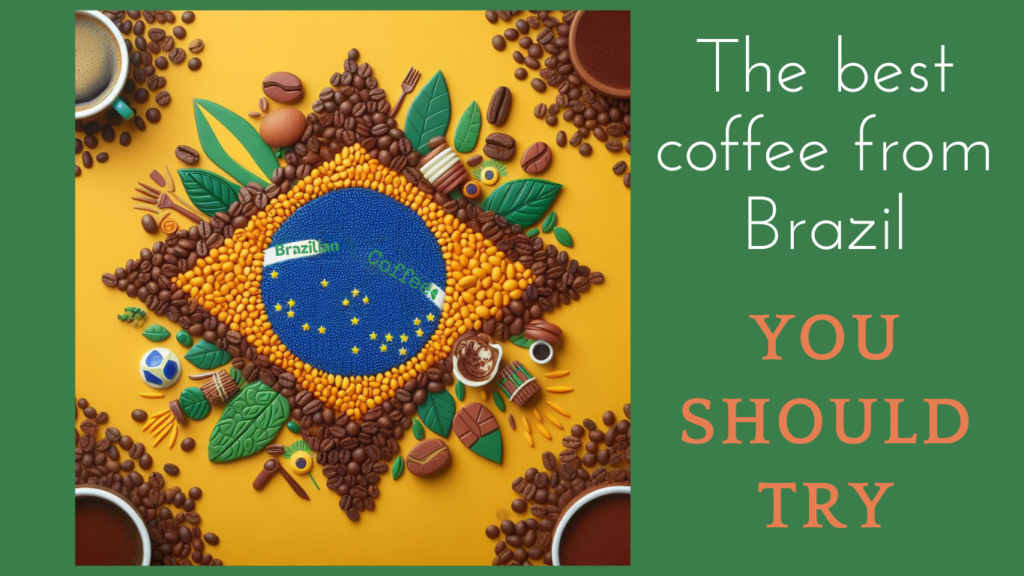Brazil is a country that has a lot to offer, from its rich culture and natural beauty to its diverse cuisine and music. But one of the things that Brazil is most famous for is its coffee. Brazil is the world’s largest producer and exporter of coffee, and its beans are used in many blends and roasts around the world.
But what makes coffee from Brazil so special? And which are the best Brazilian coffee brands that you should buy and try? In this article, I will answer these questions and more, and share with you some of the secrets of Brazilian coffee.
Please note, some of the links are affiliate links. Meaning, it you follow the links and buy a product I get a small commission. This does however not add any cost to you. Read more about it in my privacy policy.
In this blog post we will look at the following:
Is Brazil known for coffee?
The answer is a resounding yes. Brazil has a long and fascinating history of coffee cultivation, dating back to the 18th century when the first coffee plants were brought from French Guiana to the northern state of Pará.
From there, coffee spread to other regions, especially the southeastern states of Minas Gerais, São Paulo, and Rio de Janeiro, where the climate and soil were ideal for growing coffee. By the 19th century, coffee had become Brazil’s main export and a source of wealth and power for the country’s elite.
Coffee also played a significant role in the social and economic development of Brazil, as it attracted millions of immigrants, mostly from Europe, who worked in the coffee plantations and contributed to the country’s cultural diversity.
Today, Brazil is still the undisputed leader in coffee production, accounting for about a third of the global output. Brazil produces both Arabica and Robusta varieties, but Arabica dominates with about 70% of the total. Brazil also has a unique coffee classification system, based on the bean size, shape, color, and defect count, which determines the quality and price of the coffee.
Some of the highest quality Brazilian coffees are labeled as Specialty or Gourmet, and have distinctive flavors and aromas that reflect the terroir of the region where they are grown.
Brazil coffee facts
This is a sub-article on the topic The Best Coffee From South America. Here are some interesting facts about Brazilian coffee that you may not know:

- Brazil has 14 major coffee-producing regions, spread over seven states, each with its own characteristics and specialties.
- Brazil is the only country that produces all four types of coffee processing methods: natural, pulped natural, honey, and washed. The processing method affects the flavor and body of the coffee, and Brazilian coffees are usually processed using the natural or pulped natural methods, which result in sweeter and fuller coffees.
- Brazil is the world’s second-largest consumer of coffee, after the United States, and coffee is an integral part of the Brazilian culture and lifestyle. Brazilians drink coffee throughout the day, usually in small cups called cafezinhos, and often add sugar to their brews. Coffee is also served at social occasions, such as family gatherings, business meetings, and celebrations.
- Brazil has a vibrant and growing specialty coffee scene, with many coffee shops, roasters, and baristas offering high-quality coffees from different regions and farms. Brazil also hosts several coffee competitions and events, such as the Cup of Excellence, the Brazilian Coffee Week, and the Coffee of the Year.
How much coffee does Brazil produce?
According to the latest estimate from the USDA, Brazil produced 56.3 million 60-kilogram bags of coffee in the 2021/22 crop year, a decrease of 19% from the previous record crop of 69.9 million bags.
The lower production was mainly due to the biennial cycle of the Arabica trees, which produce more in even years and less in odd years, as well as the adverse weather conditions, such as drought and frost, that affected some regions.
Despite the decline, Brazil still accounted for about 30% of the world’s coffee production, and remained the top exporter of coffee, with 40.5 million bags shipped to various destinations.
That was a closer look into the production. Here is an article on the topic: what countries drink the most coffee?
Where is coffee grown in Brazil?
Coffee is grown in many parts of Brazil. Still, the main producing regions are located in the southeastern states of Minas Gerais, São Paulo, Espírito Santo, and Bahia, which together contribute almost 90% of the country’s total coffee output.
Each region has its own characteristics and specialties, and some of them have earned recognition and certification for their quality and origin. Here are some of the most famous coffee-growing regions in Brazil:
- Sul de Minas: This is the largest and most traditional coffee region in Brazil, located in the south of Minas Gerais state. It produces about 30% of the country’s coffee, mostly Arabica varieties, such as Catuaí, Mundo Novo, Icatu, Obatã, and Catuaí Rubi. The region has a high altitude, averaging 950 meters, and a mild annual temperature of around 22 degrees Celsius.
The coffees from Sul de Minas are known for their full body, low acidity, and fruity and caramel notes. - Cerrado de Minas: This is the first coffee region in Brazil to receive the Designation of Origin status, which guarantees the quality and traceability of the coffee. It is located in the northwest of Minas Gerais state, and comprises 55 municipalities. The region has a well-defined climate, with a humid summer and a mild to dry winter, and an altitude ranging from 800 to 1,300 meters.
The main varieties grown here are Mundo Novo and Catuaí, and the coffees from Cerrado de Minas are characterized by their high acidity, medium body, and sweetness. - Mogiana: This region is named after the historic railway that connected the coffee farms to the port of Santos in São Paulo state. It covers parts of São Paulo and Minas Gerais states, and has an uneven terrain with altitudes between 900 and 1,100 meters. The climate is mild, with an average temperature of 20 degrees Celsius.
The main variety grown here is Bourbon, and the coffees from Mogiana are renowned for their sweetness, balance, and citric notes. - Espírito Santo: This is the second-largest coffee-producing state in Brazil, and the largest producer of Robusta coffee, which accounts for 80% of its output. Robusta coffee is more resistant to pests and diseases, and has a higher caffeine content and a stronger flavor than Arabica.
The coffees from Espírito Santo are mainly used for blends and instant coffee, but some specialty Robusta coffees are also produced, with nutty and chocolatey notes. The state also produces some Arabica coffee, especially in the mountainous region of Montanhas do Espírito Santo, where the altitude reaches up to 1,200 meters and the climate is cooler and wetter.
The coffees from this region have a medium body, a floral aroma, and a mild acidity. - Bahia: This state is located in the northeast of Brazil, and has a diverse coffee production, with different regions and climates. The main coffee region in Bahia is the Planalto da Bahia, which covers the central and western parts of the state. It has a high altitude, ranging from 850 to 1,100 meters, and a tropical climate, with a rainy summer and a dry winter.
The main varieties grown here are Catuaí, Catucaí, and Topázio, and the coffees from Planalto da Bahia have a medium to full body, a moderate acidity, and a fruity flavor. Another important coffee region in Bahia is the Atlântico Baiano, which covers the eastern part of the state, along the Atlantic coast. It has a lower altitude, between 400 and 600 meters, and a humid climate, with a high rainfall throughout the year.
The main variety grown here is Catuaí, and the coffees from Atlântico Baiano have a light body, a low acidity, and a floral aroma.
When did Brazil become the largest producer of coffee?
Brazil became the largest producer of coffee in the world in the 1840s, when it surpassed the previous leader, Indonesia, which had been the main source of coffee since the 17th century.
Brazil’s rise to the top was driven by several factors, such as the expansion of the coffee plantations in the fertile lands of Vale do Paraíba, the development of the transportation and export infrastructure, the increase in the global demand for coffee, and the decline of the coffee production in other countries, due to wars, diseases, and competition.
Brazil has maintained its position as the world’s largest coffee producer ever since, except for a few years in the 20th century, when it was briefly surpassed by Colombia and Vietnam.
How much coffee does Brazil produce per year?
Brazil’s coffee production varies from year to year, depending on the weather conditions, the biennial cycle of the Arabica trees, and the market trends. However, Brazil usually produces more than 50 million 60-kilogram bags of coffee per year, which is equivalent to about 3 million metric tons of coffee.
In 2020, Brazil produced 3.56 million metric tons of coffee, which represented 32% of the world’s total production of 10.6 million metric tons. Brazil’s coffee production is expected to decrease slightly in 2024, due to the lower yield of the Arabica trees and the impact of the drought and frost in some regions
Is Brazilian coffee good?
This is a subjective question, as different coffee drinkers may have different preferences and tastes.
However, Brazilian coffee is generally considered to be good, especially for those who enjoy a smooth, sweet, and low-acidic cup of coffee. Brazilian coffee is one of the main components of many espresso blends, as it provides a rich and creamy base that balances well with other origins.
Brazilian coffee is also versatile, as it can be roasted to different levels, from light to dark, and processed using different methods, from natural to washed, to create different flavors and aromas.
Feel free to Pin the image to find the Brazilian coffee brands later!

Here you can see the battle between Vietnamese coffee vs American coffee
Some of the factors that influence the quality and taste of Brazilian coffee are:
- The type of bean: Brazil produces mostly Arabica beans, which are generally smoother and sweeter than Robusta beans. However, within Arabica, there are different varieties, such as peaberry, bourbon, catuai, and mundo novo. Peaberry beans are rare and considered more flavorful, while bourbon beans are aromatic and balanced. Catuai beans are resistant to diseases and pests, while mundo novo beans are high-yielding and adaptable.
- The roast level: Brazilian coffee is often roasted to a medium or dark level, which brings out the chocolate, nutty, and caramel flavors. However, some lighter roasts can also highlight the fruity, floral, and citrus notes of Brazilian coffee. The roast level also affects the body, acidity, and aroma of the coffee.
- The region of origin: Brazil has several coffee-growing regions, each with its own climate, soil, and altitude. Some of the most famous regions are Minas Gerais, Sao Paulo, Bahia, and Espirito Santo. See more detail above under the subheading Where is coffee grown in Brazil
Brazil vs Colombia coffee
Brazil and Colombia are two of the most prominent coffee-producing countries in the world, and they both offer a wide range of coffees with different characteristics and qualities.
But there are some general differences between Brazilian vs Colombian coffee that can help you decide which one suits your taste better.
- Brazilian coffee is typically lower in acidity and higher in body than Colombian coffee. This makes Brazilian coffee smoother and creamier, while Colombian coffee is brighter and more complex.
- Brazilian coffee is more diverse and versatile than Colombian coffee, as it can be grown in different regions, altitudes, and climates, and processed using different methods. This results in a variety of flavors and aromas, from chocolate and nutty to fruity and floral. Colombian coffee, on the other hand, is more consistent and uniform, as it is mostly grown in the Andes mountains, at high altitudes and with a stable climate, and processed using the washed method. This results in a clean and balanced cup, with notes of citrus, caramel, and nuts.
- Brazilian coffee is more suitable for darker roasts and espresso blends, as it provides a rich and strong base that can withstand the high temperatures and pressures. Colombian coffee is more suitable for lighter roasts and drip or pour-over methods, as it preserves the delicate flavors and aromas of the beans.
These are 5 of the best Brazilian coffee brands you should buy and try
If you are interested in trying some of the best Brazilian coffee brands, here are some recommendations that you can find online:
1. Volcanica Brazil Peaberry:
This is a medium-roast coffee made from rare peaberry beans, which are smaller and rounder than regular beans. It has a smooth and nutty flavor, with hints of hazelnut and raspberry.
It is grown at high altitudes in the Minas Gerais region, and it is certified by the Rainforest Alliance, which means it meets environmental and social standards.
2. Cooper’s Cask Brazilian Espresso Cremoso:
This is a dark-roast coffee that is specially ground for espresso machines.
It has a creamy and rich texture, with flavors of chocolate, cherry, orange, and brown sugar.
It is sourced from the Sao Paulo region, and it is roasted in small batches by a family-owned company.
Here I am showing you a nice mix with several bags. Get it here!
3. Ink Corner Cafe Organic Roasted Ground Coffee Brazil
This coffee is made from 100% Arabica beans grown in the Sul de Minas region of Brazil, which is known for its rich and fertile soil and its ideal climate for coffee cultivation. The beans are carefully selected and roasted in small batches to ensure the freshness and quality of the coffee.
Ink Corner Cafe Organic Roasted Ground Coffee Brazil has a medium roast level, which brings out the natural sweetness and nuttiness of the beans. It has a low acidity, a medium body, and a smooth and balanced flavor, with hints of chocolate and caramel. Get it here
It is already ground and ready to brew, so you can enjoy it with your favorite brewing method, whether it is drip, French press, or pour-over. And it is made in an ethical way.
4. Bustelo Brazil Coffee K-Cups
This is a dark-roast coffee that is compatible with Keurig coffee makers, and it has a bold and intense flavor, with notes of cocoa and spice.
It is made from 100% Arabica beans grown in the Sul de Minas region of Brazil, and it is roasted and packed in the USA. It is also certified by the Orthodox Union, which means it meets the standards of kosher food.
If you like a strong and rich cup of coffee, you might enjoy Bustelo Brazil Coffee K-Cups. Get it here!
5. Bones Coffee Company
This is a funny one with a combination of two of their best-selling flavors: S’morey Time and Highland Grog.
S’morey Time is a s’mores flavored coffee, with notes of chocolate, marshmallow, and graham cracker.
Highland Grog is a spiced rum flavored coffee, with notes of butterscotch and caramel. Together, they create a delicious and decadent coffee that will remind you of camping under the stars.
This coffee is made from 100% Arabica beans, which are roasted in small batches to ensure freshness and quality. It is available in ground or whole bean, and it comes in a 12-ounce bag. It is also vegan and gluten-free, and it has no added sugar or calories.
It is perfect for a cozy morning coffee or a relaxing evening, or anytime you want to treat yourself to a special cup of coffee. Get it here.
I am really trying to make articles on all the continents and coffee producing countries, Here is one on European coffee brand you can check out next.
Conclusion – The best coffee from Brazil
Brazilian coffee is a great choice for anyone who loves a smooth, sweet, and low-acidic cup of coffee.
Brazilian coffee is also diverse and versatile, as it can be grown in different regions, altitudes, and climates, and processed using different methods, resulting in a variety of flavors and aromas.
Whether you prefer a light, medium, or dark roast, a single origin or a blend, a drip or an espresso, there is a Brazilian coffee brand that will suit your taste and preference. We hope this article has helped you learn more about Brazilian coffee and its best brands, and that you will enjoy trying some of them.
Happy brewing! 😊






